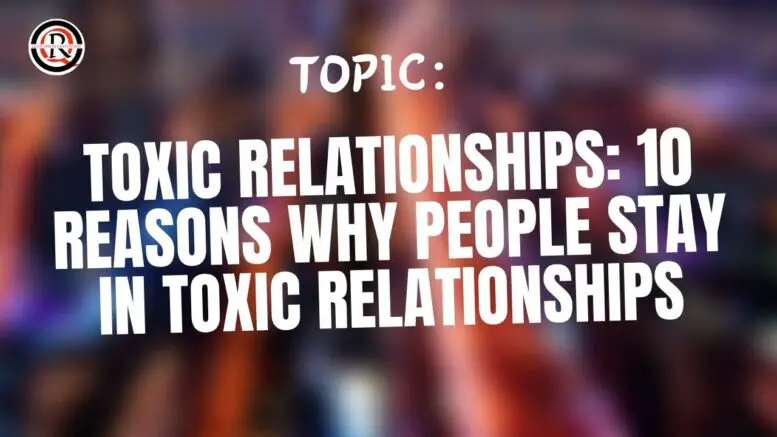Understanding the Complexity: Why People Stay in Toxic Relationships
Stories of people being in toxic relationships while displaying physical signs of sadness and frustration are common in our modern relationship , and they frequently leave us confused. Why do people continue to be in toxic relationships is a persistent question. A thorough investigation of human emotions, behaviors, and cultural influences is necessary for understanding this complexities.
1. The Comfort of Familiarity
One of the primary reasons people stay in toxic relationships is the comfort of familiarity. Humans are creatures of habit, and even when those habits are harmful, breaking away can be daunting. The known, no matter how toxic, can seem less intimidating than the uncertainty of the unknown.
2. Fear of Loneliness
Loneliness can be a powerful motivator, driving individuals to tolerate toxicity rather than face solitude. The fear of being alone, coupled with societal pressures that equate being single with failure, can trap people in unhealthy dynamics.
3. Hope for Change
Hope is a potent force. Many individuals stay in toxic relationships because they hold onto the belief that things will improve. They invest time, effort, and emotions, hoping that their partner will change or that circumstances will magically transform for the better.
4. Emotional Investment
Emotional investment plays a significant role in the decision to stay. Over time, people become deeply attached to their partners, despite the toxicity. Love, loyalty, and a sense of obligation can blur the lines between what is healthy and what is harmful.
5. Low Self-Esteem and Self-Worth
Low self-esteem can act as a barrier to leaving toxic relationships. Individuals may believe they deserve the mistreatment or that they won’t find anyone else who would treat them better. The toxic dynamics reinforce feelings of inadequacy, creating a cycle that’s hard to break.
6. Financial and Practical Concerns
Practical considerations, such as financial dependence or shared responsibilities, can also keep individuals in toxic relationships. The fear of upheaval and uncertainty regarding housing, finances, and lifestyle changes can outweigh the desire for emotional well-being.
7. Manipulation and Control
Toxic partners often employ manipulation and control tactics, making it challenging for the other person to leave. Gaslighting, threats, and emotional blackmail create a sense of powerlessness and dependency, further trapping individuals in the relationship.
8. Cultural and Societal Norms
Cultural and societal norms can exert immense pressure on individuals to stay in relationships, even when they are toxic. Expectations from family, religious beliefs, or societal standards regarding marriage and commitment can create barriers to leaving.
9. Fear of Change
Change, even positive change, can evoke fear and resistance. Leaving a long-term relationship means confronting a new reality, facing emotional upheaval, and rebuilding one’s life. This fear of change can deter individuals from taking the necessary steps to leave a toxic relationship.
10. Seeking External Validation
Some individuals stay in toxic relationships seeking external validation or approval. They prioritize societal perceptions of a successful relationship over their own well-being, hoping that outward appearances will mask internal turmoil.
Conclusion: A Path to Healing
Understanding why people stay in toxic relationships is crucial for offering support and guidance. It requires empathy, non-judgmental listening, and a recognition of the multifaceted reasons that contribute to this complex dynamic. Encouraging open conversations, providing resources for help, and promoting self-worth and empowerment are essential steps toward breaking free from toxicity and finding a path to healing and healthy relationships.
Exploring Common Beliefs about Self, Love, and Relationships
Our beliefs are like compasses guiding our choices, especially in matters of love and relationships. People often find themselves in toxic relationships due to dysfunctional beliefs about love, relationships, and self-perception. Consider these beliefs and reflect on their potential relevance to your own experiences:
- All relationships are destined to bring pain.
- Every relationship eventually turns bitter.
- Love is synonymous with suffering.
- Enduring pain is acceptable in the name of love.
- I am undeserving of love.
- Happiness is not meant for me.
- I am flawed beyond repair.
- A bad relationship is preferable to being alone.
- I cannot bear solitude.
- Their love, though flawed, is still love.
- I am unworthy of good things.
- Enduring pain is a necessary sacrifice.
- A satisfying relationship is beyond my reach.
If you feel dissatisfied or suspect toxicity in your relationship, consider these steps to move forward:
- Recall the Five A’s: Attention, Affection, Appreciation, Acceptance, and Allowing are vital aspects of a healthy relationship. Evaluate if these elements are present in your current relationship.
- Recognize Your Role: Acknowledge your contribution to the relationship dynamic. What you tolerate will persist, so take accountability for your part in maintaining patterns.
- Establish Boundaries: Identify and assert your boundaries, even in an established relationship. Knowing your limits increases self-worth and prepares you for healthier relationships in the future.
- Value Outside Perspectives: Consider feedback from those who care about you. Their concerns may reflect aspects of your relationship that need attention.
- Seek Support: Toxic relationships can be traumatizing. Seek social and professional support to empower yourself and embark on a healing journey.
Ultimately, our self-worth shapes the quality of relationships we accept. Challenge your beliefs and affirm your worthiness of fulfilling love and affection. Ask yourself:
- Why do I stay in this relationship?
- Do I believe I deserve fulfilling love?
By questioning and reshaping your beliefs, you pave the way for a healthier, happier relationship landscape.


Be the first to comment on "Toxic Relationships: 10 Reasons Why People Stay In Toxic Relationships"